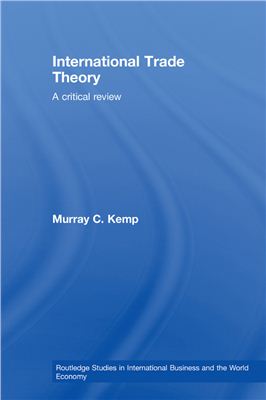Murray C. Kemp is Emeritus Professor at the University of New South
Wales in Sydney and has previously served as President of the
Inteational Economics and Finance Society.
241 pages.
This book, the third in a three-volume set, brings together several chapters on the current state of the theory of inteational trade. Critical in tone, the chapters show that several long-established propositions, conceing free trade for example, are seriously defective. On the other hand, Kemp’s chapters are also constructive. Thus the inteational equalization of factor prices, once thought to be possible only under perfectly competitive conditions with a unique market equilibrium, is shown to be possible even when producers exercise market power and the equilibrium is not unique. Similarly, the book offers a much more realistic analysis of inteational transfers by allowing for the possibility that donors and recipients care about the well-being of each other. Finally, the book explores the implications of the fact that many
countries can no longer survive autarchy, that is, without trade.
Written by one of Australia’s foremost economists and covering subject areas such as the theory of inteational trade, inteational finance and investment and aid, this book is highly interesting and topical. Its accessible style makes it an important book for anyone with a desire to understand the causes and implications of inteational trade.
241 pages.
This book, the third in a three-volume set, brings together several chapters on the current state of the theory of inteational trade. Critical in tone, the chapters show that several long-established propositions, conceing free trade for example, are seriously defective. On the other hand, Kemp’s chapters are also constructive. Thus the inteational equalization of factor prices, once thought to be possible only under perfectly competitive conditions with a unique market equilibrium, is shown to be possible even when producers exercise market power and the equilibrium is not unique. Similarly, the book offers a much more realistic analysis of inteational transfers by allowing for the possibility that donors and recipients care about the well-being of each other. Finally, the book explores the implications of the fact that many
countries can no longer survive autarchy, that is, without trade.
Written by one of Australia’s foremost economists and covering subject areas such as the theory of inteational trade, inteational finance and investment and aid, this book is highly interesting and topical. Its accessible style makes it an important book for anyone with a desire to understand the causes and implications of inteational trade.

